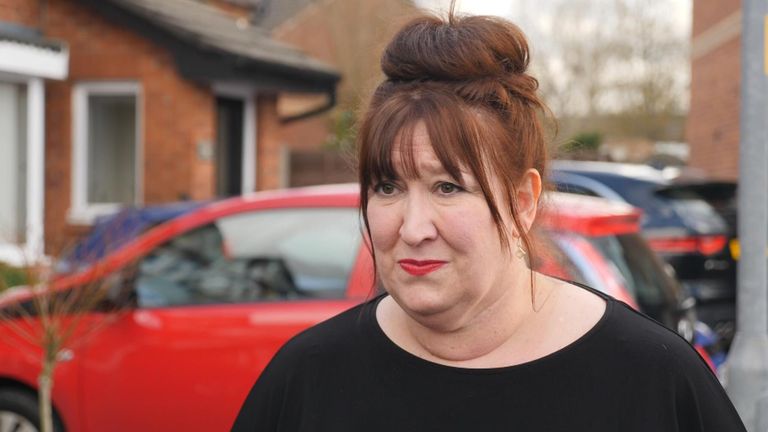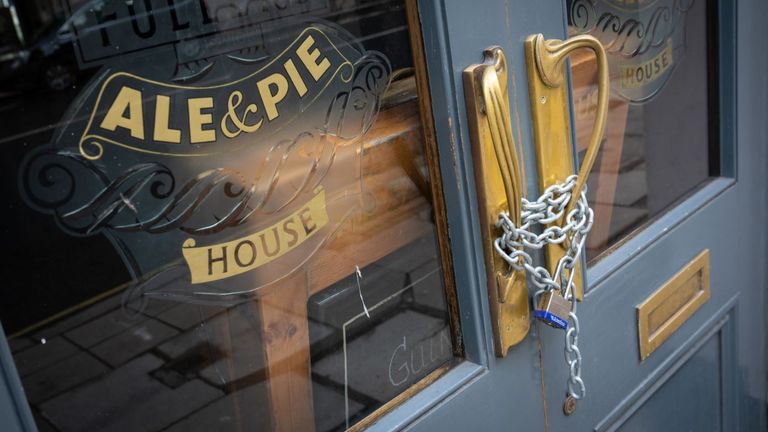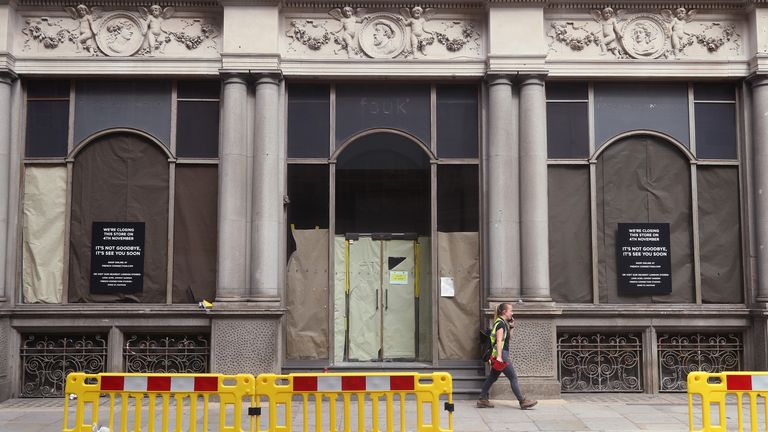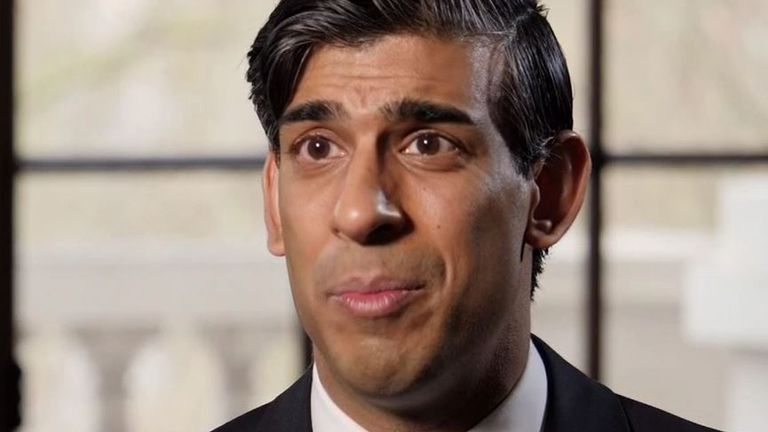A £5bn grant scheme to help pubs, restaurants and retailers hit hardest by lockdown restrictions is set to be unveiled by the chancellor in Wednesday’s budget.
Rishi Sunak is also planning to support first-time buyers by incentivising lenders to accept deposits of just 5% for properties up to £600,000.
The chancellor has warned hard decisions will need to be made to repair the economic damage wrought by COVID-19 – but Labour and some Conservative backbenchers have cautioned Mr Sunak against increasing taxes.
Chancellor Rishi Sunak will be interviewed live on Sophy Ridge On Sunday from 8.30am on Sky News
To help businesses open as lockdown is gradually eased in the coming months, non-essential shops in England will be able to apply for “restart grants” worth up to £6,000 per premises.
Hospitality venues, hotels, gyms and leisure firms – which will only be allowed to open later in the government’s roadmap – are going to be eligible for up to £18,000.
Estimates from the Treasury suggest that as many as 230,000 businesses could be entitled to this higher band of support, and an additional £794m in funding is also being earmarked for the devolved nations.
Acknowledging that local businesses have been severely affected by the pandemic, Mr Sunak said: “There’s now light at the end of the tunnel and this £5bn of extra cash grants will ensure our high street can open their doors with optimism.”
UKHospitality was among those to welcome the grants programme – but the trade body warned it should be part of a wider package including an extension to reduced VAT rates, as well as a business rates holiday.
It’s also been confirmed that a mortgage guarantee scheme that’s designed to help aspiring homeowners on to the property ladder will feature in Mr Sunak’s second budget.
The Treasury says low-deposit mortgages have “virtually disappeared” as a result of COVID-19, and it’s hoped the new policy will see 95% loan-to-value deals return to the market.
In the Commons, Mr Sunak will set out how the government will offer lenders the guarantee they require to provide such mortgages.
Declaring that he wants Generation Rent to become Generation Buy, Prime Minister Boris Johnson added: “Young people shouldn’t feel excluded from the chance of owing their own home, and now it will be easier than ever to get onto the property ladder.”
Unfortunately, it’s highly likely that the axe will have to fall in other areas, with government borrowing surging over the past year to pay for the response to COVID-19. State debt had increased to £2.1trn by the end of January, the highest debt-to-GDP ratio in almost 60 years.
Speaking to the Financial Times, the chancellor warned that the UK is “exposed” to changes in currently low interest rates – and a rise of just 1% would add £25bn a year to the cost of servicing debt.
“We went big, we went early, but there is more to come and there will be more to come in the budget. But there is a challenge and I want to level with people about the challenge,” he said.
The Sunday Times reports that Mr Sunak will set out plans to raise income tax by £6bn as he tries to find the additional £43bn a year that’s required to plug the gaping hole in the nation’s finances.
According to the newspaper, the tax-free allowance of £12,500 is going to be frozen for the next three years – despite the fact that it traditionally rises annually. The threshold for paying a higher 40% rate of income tax will also remain at £50,000 until 2024 at the earliest.
Although these proposals don’t technically breach a Tory manifesto pledge not to raise income tax rates, figures suggest that it will mean 1.6 million people are pushed into the higher tax band by 2024.
Meanwhile, The Sunday Telegraph is reporting that Mr Sunak is plotting to introduce a new tax on online deliveries – and could increase National Insurance contributions paid by the self-employed later this year.
Alarm bells are also ringing among some Conservative MPs amid claims that the chancellor is considering raising corporation tax to as much as 25% – up from the current level of 19%.
A mounting band of Tory rebels have warned that they would be prepared to vote against attempts to increase taxes, but Downing Street has shot back – warning that they could lose the party whip if they refuse to back the budget.
Labour has also said that it opposes any tax rises in the short term, while the Centre for Policy Studies, a centre-right think-tank, has warned that increasing corporation tax would put a “drag on growth” and result in lower wages and investment.
Under increasing pressure to set out its vision of a government led by Sir Keir Starmer, Labour is calling for a “jobs promise” to prevent a “lost generation” in the wake of COVID-19 – with a guarantee that young people will be offered education, training or employment opportunities.
The party estimates that more than one million people will become “long-term unemployed” across 2021 and 2022. It also fears that 16 to 24-year-olds could be especially affected, with 660,000 in this age group projected to spend at least six months out of work, education or training by the end of next year.
Subscribe to the Daily podcast on Apple Podcasts, Google Podcasts, Spotify, Spreaker
Shadow work and pensions secretary Jonathan Reynolds said: “Throughout this crisis we’ve seen the chancellor determined to remove support as quickly as possible, despite the fact restrictions mean large parts of the economy are still closed. His actions have cost jobs and businesses.
“Successive Conservative governments have weakened Britain’s foundations and robbed too many people of the opportunity to achieve their potential. Going back to business as usual is not an option.”









